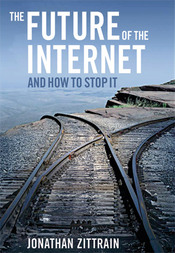The rise of e‑books opens up new horizons for readers, and also the possibility that books will be “Napsterized,” as The New York Times explains. The Times article begins:
You can buy “The Lost Symbol,” by Dan Brown, as an e‑book for $9.99 at Amazon.com.
Or you can don a pirate’s cap and snatch a free copy from another online user at RapidShare, Megaupload, Hotfile and other file-storage sites.
Until now, few readers have preferred e‑books to printed or audible versions, so the public availability of free-for-the-taking copies did not much matter. But e‑books won’t stay on the periphery of book publishing much longer. E‑book hardware is on the verge of going mainstream…
With the new devices in hand, will book buyers avert their eyes from the free copies only a few clicks away that have been uploaded without the copyright holder’s permission? Mindful of what happened to the music industry at a similar transitional juncture, book publishers are about to discover whether their industry is different enough to be spared a similarly dismal fate. (Get the rest here.)
Needless to say, publishers are getting nervous. But some see the “Napsterization” of books being more hype than real. As author Seth Harwood told me on Twitter (find our Twitter stream here), The “nyt article on ebook piracy is spin. If more people are reading, even stolen books, publishers win. Too much fear of zero sum.” In the comments section below, Seth goes beyond 140 characters and spells out why publishers should take a deep breath. They might actually have more to gain than lose, if they play their cards right. Give his thoughts a read, and keep in mind that he landed a Random House contract by giving his books away as free audio podcasts.
 Lawrence Lessig calls Jonathan Zittrain’s book “Absolutely required reading.” Cass Sunstein says it’s “Absolutely essential reading.” And Lawrence Tribe declares that it is “The most compelling book ever written on why a transformative technology’s trajectory threatens to stifle that technology’s greatest promise for society.”
Lawrence Lessig calls Jonathan Zittrain’s book “Absolutely required reading.” Cass Sunstein says it’s “Absolutely essential reading.” And Lawrence Tribe declares that it is “The most compelling book ever written on why a transformative technology’s trajectory threatens to stifle that technology’s greatest promise for society.” If you haven’t heard the news… Sony is releasing a new e‑book reader, its answer to Amazon’s Kindle. Retailing at $399, the Sony reader will feature a touch screen (something the Kindle doesn’t have) and the ability to download books wirelessly (something the Kindle does have). It will also provide access to thousands of free (public domain)
If you haven’t heard the news… Sony is releasing a new e‑book reader, its answer to Amazon’s Kindle. Retailing at $399, the Sony reader will feature a touch screen (something the Kindle doesn’t have) and the ability to download books wirelessly (something the Kindle does have). It will also provide access to thousands of free (public domain) 
